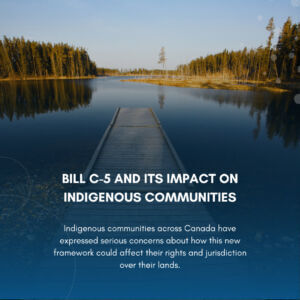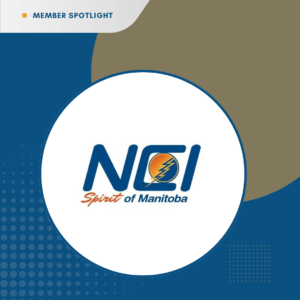by ICC Staff

With the election of the new Liberal government, issues surrounding pipeline proposals, and energy infrastructure more broadly, have once again reentered the national conversation.
Prime Minister Mark Carney said recently that “it is highly likely that we will have an oil pipeline that is a proposal for one of these projects of national interest,” regarding a project in British Columbia.
The proposals, which includes the Trans Mountain Expansion (TMX), among others, have the potential to bring about vast economic opportunities for Indigenous communities; these projects, however, are not without their set of environmental and sovereignty concerns.
Economic Opportunities Through Equity Ownership
In contrast with previous projects, recent proposals have included Indigenous communities as equity stakeholders, symbolizing a renewed commitment to Indigenous economic reconciliation. The Enbridge Westcoast pipeline, for instance, recently involved a 12.5% stake from an Indigenous collective, amounting to shares worth $400 million.
Similarly, TC Energy sold a $1 billion stake to 72 independent Indigenous communities. The turn toward equity ownership in large-scale infrastructure projects marks not just a shift in values but also marks the beginning of a new kind of economic model of public-private partnership.
In both aforementioned cases, the stakes involved government-backed loan guarantees. This, according to an article by Time Magazine, not only ensures that Indigenous communities are able to reap direct economic benefits from the projects but also ensures that the communities are able to participate in the decision-making process on important projects set to impact them.
Beyond the equity ownership, many of these projects carry with them substantial employment and procurement opportunities for both Indigenous communities and businesses. Reports on TMX suggest over 3,600 Indigenous workers were hired during construction, alongside more than $6 billion in contracts awarded to Indigenous businesses.
These projects help connect local entrepreneurs with larger supply chains and infrastructure upgrades, strengthening Indigenous networks in the process. Yet these projects are not without their significant drawbacks.
Sovereignty and Environmental Concerns
While pipeline projects promise economic benefits, many Indigenous communities have raised strong concerns that they violate treaty rights and undermine Indigenous sovereignty. Critics argue that these large-scale developments often proceed without the full consent of traditional governance systems.
The Coastal GasLink pipeline is a prominent example — despite agreements with some elected band councils, it has faced ongoing resistance from Wet’suwet’en Hereditary Chiefs, who assert authority over the land. Such conflicts highlight the tension between economic development and Indigenous self-determination.
Beyond sovereignty issues, communities have also pointed to serious environmental concerns. Environmental regulators reported over 50 breaches in sediment control along the Coastal GasLink route, raising alarms about damage to waterways and the disruption of traditional practices like fishing and hunting.
Barriers and the Path Forward
Projects like the Eagle Spirit Pipeline — though Indigenous-led — still face obstacles due to Canada’s tanker ban and the legal precedent of the Northern Gateway cancellation. Moreover, systemic barriers under the Indian Act continue to limit Indigenous entrepreneurs’ access to capital, as land on reserves often cannot be leveraged for financing.
Together, these issues underline the need for more comprehensive consultation, stronger environmental protections, and reforms that truly empower Indigenous leadership. For Indigenous businesses and communities, pipelines offer pathways to growth and inclusion in Canada’s evolving energy economy — but meaningful, rights-based consultation and policy reforms remain essential to ensure these benefits are sustainable, equitable, and respectful of Indigenous sovereignty.
Join Our Newsletter
As Manitoba's voice for Indigenous business and your partner in economic reconciliation, we connect you to opportunities that drive change. Subscribe to receive updates on Indigenous business developments, partnership opportunities, and upcoming events delivered straight to your inbox.



